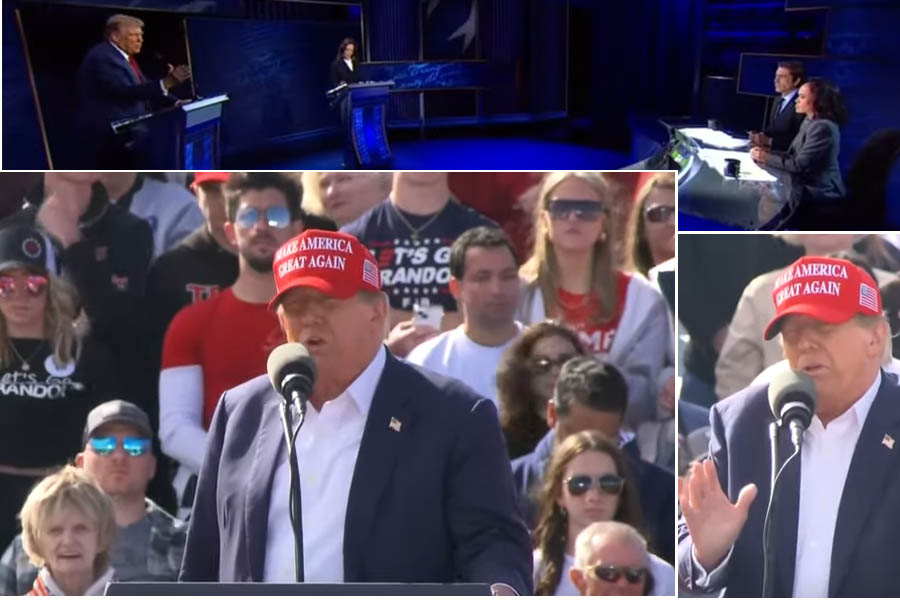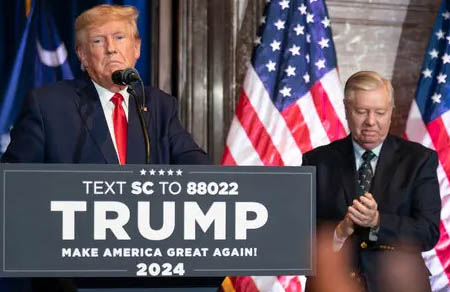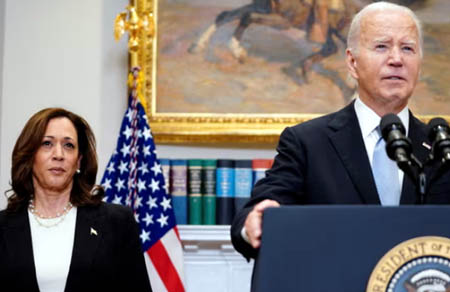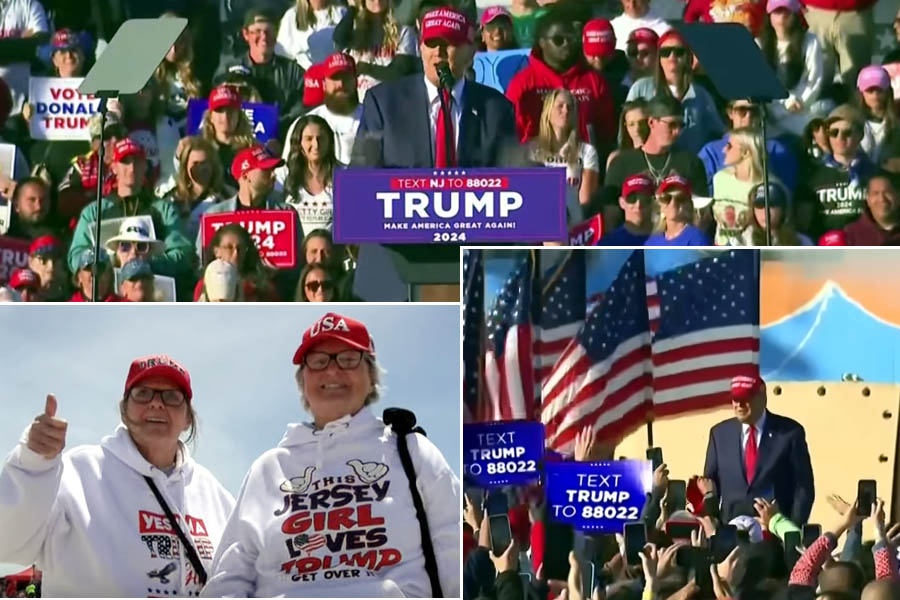
As the 2024 U.S. presidential election draws nearer, voters face a clear choice between Donald Trump, the former president and Republican nominee, and Kamala Harris, the current vice president and Democratic candidate. Trump’s enduring influence is driven by his strong appeal and psychological impact on the electorate, highlighting his focus on national strength, leadership, and a clear vision for America's future. His America First policy and critical stance on U.S. involvement in the Ukraine war resonate with a significant portion of voters who see him as a defender of American interests.
In contrast, European leaders are quietly opposing Trump, preferring a Democratic victory that would likely bring Kamala Harris to the presidency. This preference stems from Trump’s outspoken criticism of U.S. financial support for Ukraine, which threatens European reliance on American resources and military support. Countries like Germany, France, and Luxembourg, which have benefited from U.S. aid, view Harris as a more favorable option, anticipating a continuation of the existing international alliances and economic relationships. For these European elites, Harris represents a more pliable leader who would maintain the status quo, making her a more attractive choice. Europeans leadership who are behind for politics curtain knows better to suck America? ohu they are leaping their tounge.
The Economic Power Struggle: Europe Sucking America Dry?
Underneath this geopolitical drama lies a deeper economic dynamic. Many Trump supporters believe that Europe, while enjoying U.S. defense protection and economic support, has been exploiting American resources. Economically, Europe is seen by some as "sucking America dry," benefiting from trade deals and alliances while failing to adequately contribute to shared responsibilities, particularly in military spending. Trump's opposition to further funding for the Ukraine war, combined with his calls for NATO countries to increase their defense budgets, reflects this broader concern that Europe is not pulling its weight.
This resentment has fostered a sense of betrayal among Trump's base, who view European leaders as hypocritical and self-serving. They argue that Europe’s opposition to Trump is not rooted in concerns about American democracy or values, but rather in a fear of losing the economic and military support that has allowed Europe to prosper at America’s expense. For these voters, Trump's policies are not isolationist but protective—designed to safeguard American interests from European overreach.
Kamala Harris and the Luxembourg Connection: A Dirty Dogma?
In this context, the relationship between Kamala Harris and European politicians, particularly those from Luxembourg, has drawn scrutiny. Luxembourg, a small but influential financial hub in Europe, plays a key role in the EU’s economic landscape, and some Trump supporters believe there is a "dirty dogma" at play between Harris and key figures in Luxembourg’s political elite. This narrative suggests that Harris, with her more globalist stance, is seen as a more favorable candidate for European leaders because she would continue policies that align with their interests, particularly in maintaining close financial ties between the U.S. and Europe.
Luxembourg, with its favorable tax policies and status as a haven for multinational corporations, has long been at the center of debates about economic fairness. Trump, who has frequently railed against European countries for benefiting from U.S. trade deals while offering little in return, sees Luxembourg as symbolic of a broader issue: European nations manipulating global systems for their own gain. The suspicion among Trump’s base is that European politicians, particularly those with close ties to the financial sectors, prefer Harris because her policies are seen as less threatening to their economic dominance.
Trump’s Challenge to European Dogma
For American voters, especially those who support Trump, the fierce opposition from Europe is a sign that Trump is challenging an entrenched, "dirty" system. They see the European resistance as confirmation that Trump’s policies, from curtailing funding for Ukraine to demanding fair trade practices, are putting American interests first. For these voters, the cozy relationship between Harris and European elites represents more of the same old politics—where America is taken advantage of while European leaders benefit from American generosity without reciprocation.
In contrast, Trump's America First platform promises to break these ties, forcing Europe to stand on its own and confront its own issues without relying on American intervention. Voters who resonate with Trump’s worldview see this as a necessary realignment of global power, one that will protect American sovereignty and economic strength. As the election season heats up, these issues are likely to shape the thinking of American voters. The question they face is not just about who will lead the country, but about how America should engage with the world, particularly with Europe. Trump’s tough stance on foreign funding, his critique of NATO, and his skepticism toward European alliances appeal to voters who feel that America has been exploited on the global stage. For these voters, the idea that European politicians favor Harris only reinforces their belief that Trump is the right leader to challenge a system that has long taken advantage of American generosity.
A Clear Vision for America
Donald Trump’s leadership style has always centered on bold decisions and unapologetic nationalism. He paints a vision of a strong, independent America, free from foreign interference and economic dependency. In contrast to Kamala Harris, who tends to focus on policies like social justice and economic opportunity, Trump emphasizes security, sovereignty, and a clear-cut vision of American greatness. For many voters, this focus on a powerful America is crucial, especially when geopolitical tensions with nations like Russia and China remain at the forefront of global politics.
Trump has consistently portrayed himself as the leader best equipped to handle these challenges. His message resonates with voters who believe that a strong, assertive president is needed to keep America safe from external threats. In this psychological drama of international politics, where weak leadership can invite foreign powers to "hammer and play with" the U.S., as Trump supporters often argue, a powerful figure like Trump becomes the antidote to perceived vulnerability.
Psychological Appeal of Strength and Dominance
At the heart of Trump’s political success is his psychological appeal to voters who value strength, authority, and dominance. His persona is rooted in confidence, and he positions himself as the fighter who never backs down from a challenge—be it from the media, political rivals, or international adversaries. This sense of strength is key to why many of his supporters remain loyal to him. In their view, a weak or indecisive leader, such as Harris, risks being manipulated by foreign actors, particularly figures like Russian President Vladimir Putin.
While Harris has shown competence and intelligence, especially as a prosecutor, she faces the challenge of overcoming the perception that she lacks the toughness that Trump exudes. In debates and public appearances, Harris often employs humor and wit to disarm opponents, but Trump’s bombastic, combative style appeals more to voters who equate leadership with aggressive action rather than measured diplomacy.
The Debate Over Voting Laws
Trump’s strong stance on voting laws also sets him apart from Harris in the eyes of many conservative voters. His call for stricter voter identification laws, including his push for the Safeguard American Voter Eligibility Act, is designed to address concerns about election security. Although there is little evidence that noncitizens have affected federal elections, Trump's emphasis on protecting the integrity of elections speaks to a broader psychological need for fairness and control among his supporters.
The rhetoric surrounding voting laws also taps into deeper concerns about losing control of the nation's future. Many Trump voters feel that the Democratic Party, under leaders like Harris, is too lenient on issues such as immigration and voting rights, potentially diluting American values and allowing noncitizens to shape the country's destiny. By positioning himself as the defender of these values, Trump reinforces his image as the candidate who will preserve the essence of America.
The Drama of the Debates
As Trump and Harris prepare to face off in debates, voters are already drawing lines between their approaches. Trump thrives in debates where he can dominate the stage, often relying on blunt attacks and dramatic moments to galvanize his base. Harris, on the other hand, will likely rely on her prosecutorial skills to cross-examine Trump, attempting to portray him as reckless and out of touch. However, the psychological stakes in these debates are high. For many voters, especially those undecided or leaning Republican, a powerful performance by Trump will reinforce the idea that he is the strong leader America needs.
In contrast, Harris may struggle to present herself as equally tough without appearing overly combative or defensive. This is a delicate balance, as voters often judge female candidates more harshly when they appear too aggressive. Trump’s previous experience in debates against figures like Joe Biden and Hillary Clinton has shown that his unpredictability and sheer force of personality can overshadow policy discussions, drawing attention away from nuanced arguments.
The Fear of Weak Leadership
Ultimately, the psychological argument for Trump over Harris boils down to fear: the fear that weak leadership will leave America vulnerable to foreign manipulation and domestic instability. Trump’s supporters believe that only a leader with his assertive, nationalist approach can safeguard America’s interests on the global stage. Harris, for all her political acumen, is perceived as lacking the hard edge needed to confront these challenges head-on.
In this light, Trump's call for government shutdowns and tough measures on voting laws are not seen as reckless, but as necessary actions to protect America from a future where other nations, particularly Europe, Russia and China, hold too much sway. For those who value a leader who will fight—both figuratively and literally—for the country’s future, Trump remains a powerful, mighty figure in American politics.
Europe making hard for America moving better, European politicians favor Harris only reinforces their belief that Trump is the right leader to challenge a system that has long taken advantage of American generosity. As the 2024 election approaches, American voters will have to decide whether they want the assertive, sometimes controversial leadership of Donald Trump or the more measured, diplomatic approach of Kamala Harris. The choice is not just political but deeply psychological, reflecting voters' beliefs about what makes a strong and effective president.
#DonaldTrumppowerful #EuropeopposesTrump #TrumpvsKamalaHarris2024 #KamalaHarrisweakleadership #USelectiongamechanger #Psychologicalimpact #KamalaHarris
Thank you for reading: globalpostheadline.com





